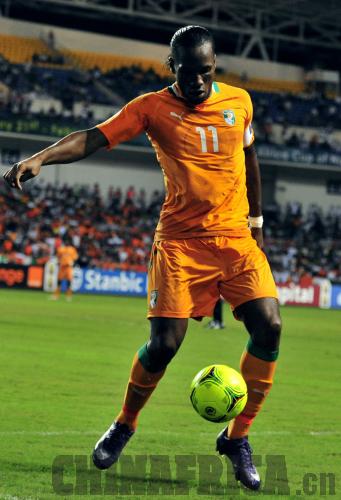|
 |
|
Ivorian striker Didier Drogba XINHUA/AFP |
Billed as the biggest and most entertaining football tournament that binds the continent together, the Africa Cup of Nations (Afcon) starts on January 19 in South Africa bringing the 16 top teams to the field.
While some of Africa's biggest teams will be absent from the tournament due to their failure to qualify, among them, Cameroon, Egypt, Algeria and Guinea, the tournament still promises to showcase some of the world's best players. Returning to the fold this year are soccer giants Nigeria, South Africa and Morocco.
Afcon history
But how did this tournament begin? Of course, African football was still in its infancy when the Confederation of African Football (CAF) staged the inaugural Nations Cup in February 1957.
However, the real concept of the tournament was conceived a year earlier in Lisbon, during a meeting between seven delegates asked to look into ways of building an African Union and launching a competition between the different countries of the continent.
This resulted in the formation of the CAF, which planned the first tournament a year later in Khartoum, Sudan.
As the date drew near, there were a few hurdles to overcome, such as the exclusion of South Africa after the apartheid regime failed to approve a multi-racial team. With South Africa out, the tournament came down to a play-off between just three teams – Egypt, and hosts Sudan and Ethiopia.
The three teams played the first two tournaments in odd years before it increased to four, six, eight, 12 and then the current 16 teams. Each adjustment of teams increased the chances of seeing the best players on the continent. Since the early days, North Africa, and Ghana in particular, maintained its reputation as the continent's stars, while the other pioneers, Ethiopia and Sudan, have struggled to remain in contention for the biannual fiesta, which is arguably the biggest sporting competition in Africa.
Though there have been organizational problems with the tournament, one thing is certain - the Africa Cup of Nations is still in existence due to the passion for the game on the African continent.
That explains why countries as poor as Mali have agreed to contribute millions of dollars to stage the competition. The West African giant defied its poor economic status to host the 2002 tournament, which Cameroon won, beating Senegal in a penalty shootouts.
Tunisia was the next stop and host, claiming the title in 2004, while in 2006, Egypt made it five titles as they edged out Cote d'Ivoire in the finals.
Egypt set a new African record, not being defeated for 19 consecutive Cup of Nations matches, since a 2-1 loss against Algeria in Tunisia in 2004. It clinched the Afcon 2010 beating Ghana 1-0.
In May 2010, it was announced that the tournament would be moved to odd-numbered years starting in 2013. This means it will not take place in the same year as the FIFA World Cup.
A new champion emerged in Equatorial Guinea and Gabon, the co-host of the 2012 tournament, with Zambia edging out the giants. Named Chipolopolo (Copper Bullets) Zambia beat Cote d'Ivoire 8-7 on post-match penalties having drawn 0-0 in normal and extra time.
|